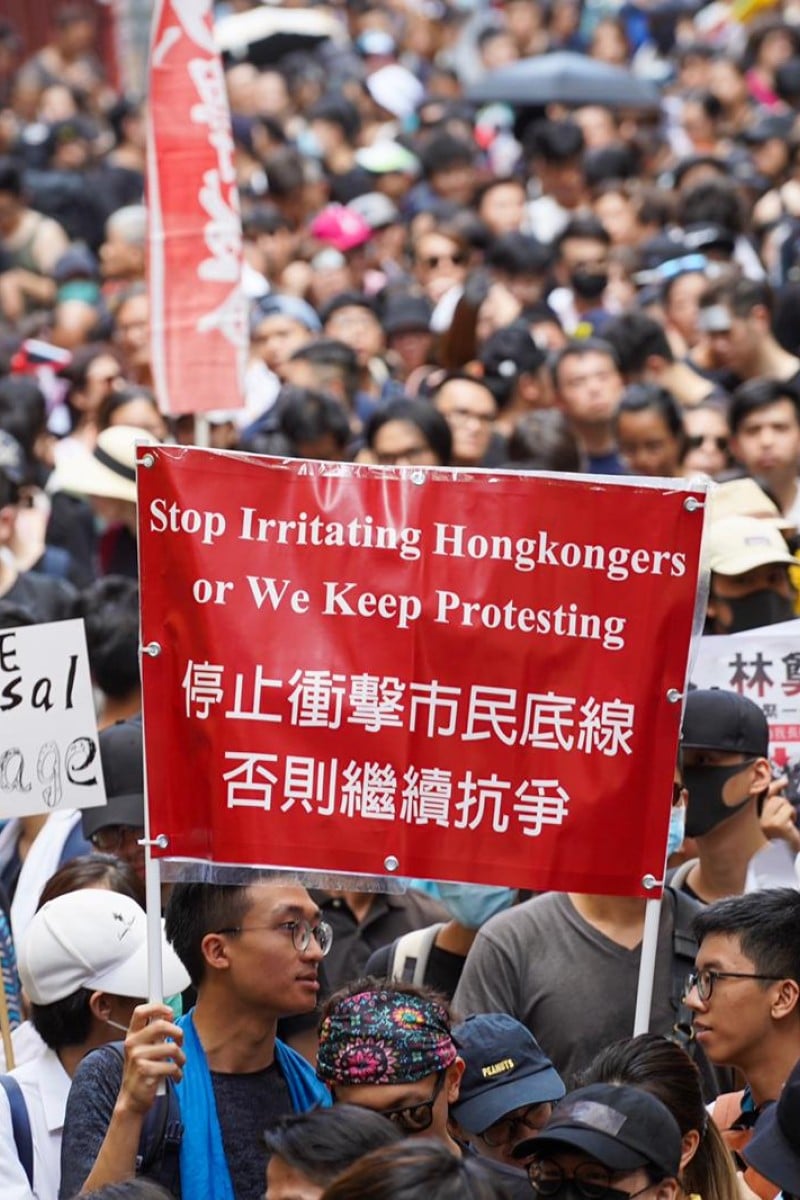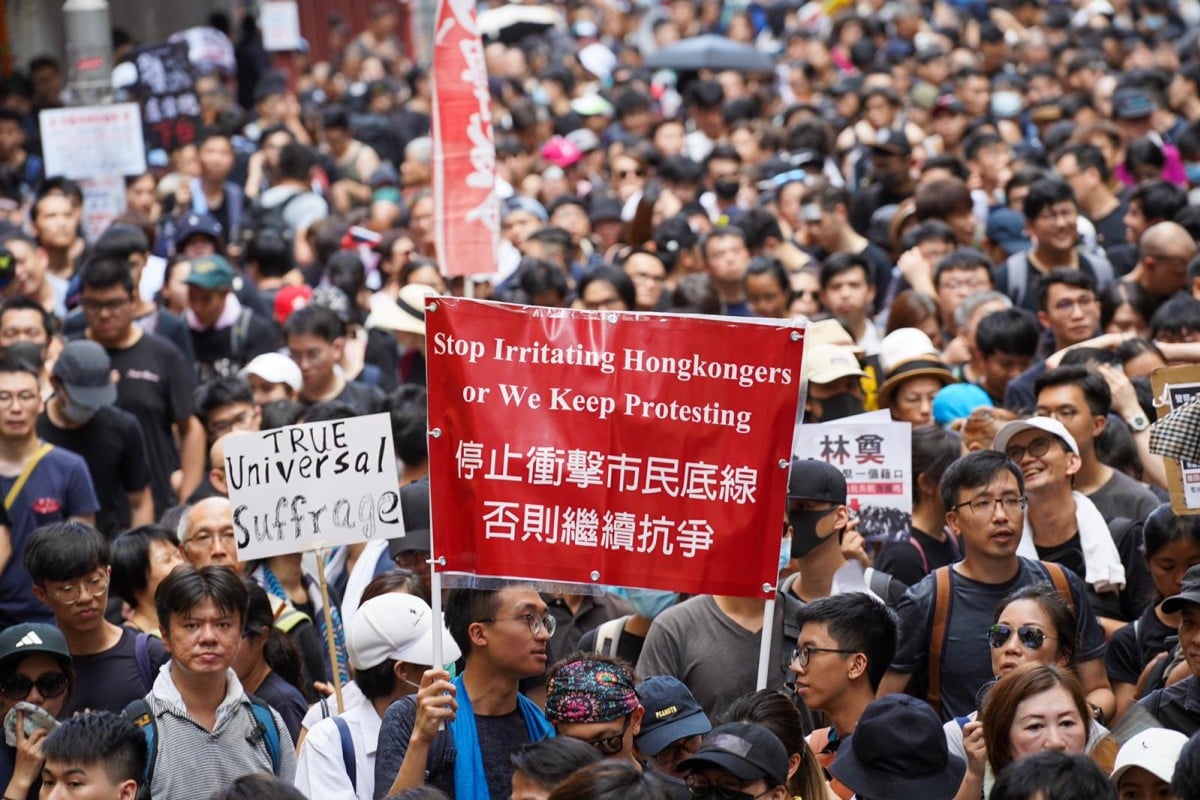
Young protesters express their feelings about the recent political unrest

Another mass rally organised by the Civil Human Rights Front was held on July 21, beginning at Victoria Park in Causeway Bay at 3.30pm. Protesters went pass the official ending point of Luard Road in Wan Chai and occupied roads in Central and Admiralty after police unexpectedly retreated from the original ending point.
A smaller group also headed to Beijing’s liaison office in Sai Yin Pun and vandalised the front of the building. Organisers put the attendance figure at 430,000, while police put the figure at 138,000.
Young Post spoke to some of the younger participants of the protest to find out why they are participating in the sixth large-scale rally against the now-suspended anti-extradition bill.
A 15-year-old student surnamed Chan told Young Post he joined the march today primarily because Carrie Lam refused to withdraw the extradition bill completely and because he felt the police force had abused their power.
Hong Kong extradition bill: Live updates from July 21 anti-ELAB protests
“The force’s actions have been intolerable. I must stand up to it and express my views, especially as [some citizens] showed support for the police in a rally yesterday,” said the Yan Chai Hospital Wong Wah San Secondary School student.
Despite his participation in the march, Chan admitted he doubted the effectiveness of peaceful protests, and would participate in escalated protest actions, even if it might involve violence. “I have never thought of giving up the movement,” he added.
A female student surnamed Au Yeung, however, confessed that quitting the movement was a thought that had crossed her mind. “It is very hot and exhausting [to participate in the outdoor marches or rallies],” said the 16-year-old who is studying at a girls’ school in Kowloon. “But for Hong Kong, it’s worth it.”
Even though peaceful protests have not proven to be very useful in effecting concrete change, Au Yeung and her schoolmate both agreed that it’s better to take to the streets to show their dissatisfactions towards the government than do nothing.
“We’re here in solidarity with the fellow protesters: to encourage them to continue the fight for the complete withdrawal of the bill and show them there’s still hope,” said Au Yeung’s friend who preferred not to reveal her identity.
“It’s really important to have our voices heard by the government [because] the police should be held accountable for [the excessive force they’ve used] to the protesters,” said another young participant surnamed Cheung. The Education University of Hong Kong student has been part of the anti-extradition law movement since June 9.
Hong Kong extradition bill: Young Post readers share biggest fears for Hong Kong
Despite feeling pessimistic about their chances of having their demands met by the government, Cheung added that protest actions still needed to be taken, or “there’s absolutely no possibility of achieving anything”.
“The history of India and some European countries have shown us that peaceful protests can be effective,” Cheung said. “But they might not have the same impact in Hong Kong, since we are facing the Communist regime which is getting increasingly powerful and brutal.” He added that protesters might need to resort to violence, when necessary, for self-defense.
Marco Yee Lok-kan - the Acting External Secretary of City University of Hong Kong’s Students Union - concurred that peaceful protests might not change the minds of government officials, and regarded protesters’ escalating actions in the former protests as “force” rather than “violence”.
“We can no longer stick to the peaceful, rational, non-violent, and no-foul-language means... when tear gas and pepper spray have become the minimum type of weapons used against us.” Like Cheung, the 19-year-old has joined the movement since June 9.
“Since June 9, we have uttered our five demands very clearly. I don’t think closed-door meetings [with the Chief Executive Carrie Lam Cheng Yuet-ngor], negotiations or compromises are needed.... All we want is for the government to respond to our demands,” Marco said.
He added that it’s understandable that some protesters might have felt dispirited during the movement which has already lasted for one-and-a-half months. “But we must fight on and not see each demonstration as a one-off event, or we won’t be able to move a regime.”
Ultimately, Marco hopes Hong Kong society will be reformed. “We will not give up Hong Kong, the place where we were born and raised.”
Jacky So Tsun-fung, President of the Student Union of the Chinese University of Hong Kong, was also seen at the protest. Participating in the anti-extradition bill movement since March 31, the 19-year-old said he had witnessed the protests develop into a series of resistance movements.
“It has spread widely to various districts and communities in Hong Kong, as shown by the presence of many Lennon Walls across the city. This was rarely seen in the past democratic movements of Hong Kong,” said Jacky, who described every single contribution to the movement as "meaningful".
He told Young Post that he joined the march today because the five demands requested by Hongkongers had yet to be met with a government response, while referring to the establishment of an independent commission of inquiry as the most pressing issue.
When asked if he was worried that the protest would escalate into more violence on the night of July 21, he said the student union could only play it by ear, but would provide resources and legal support for students in need.